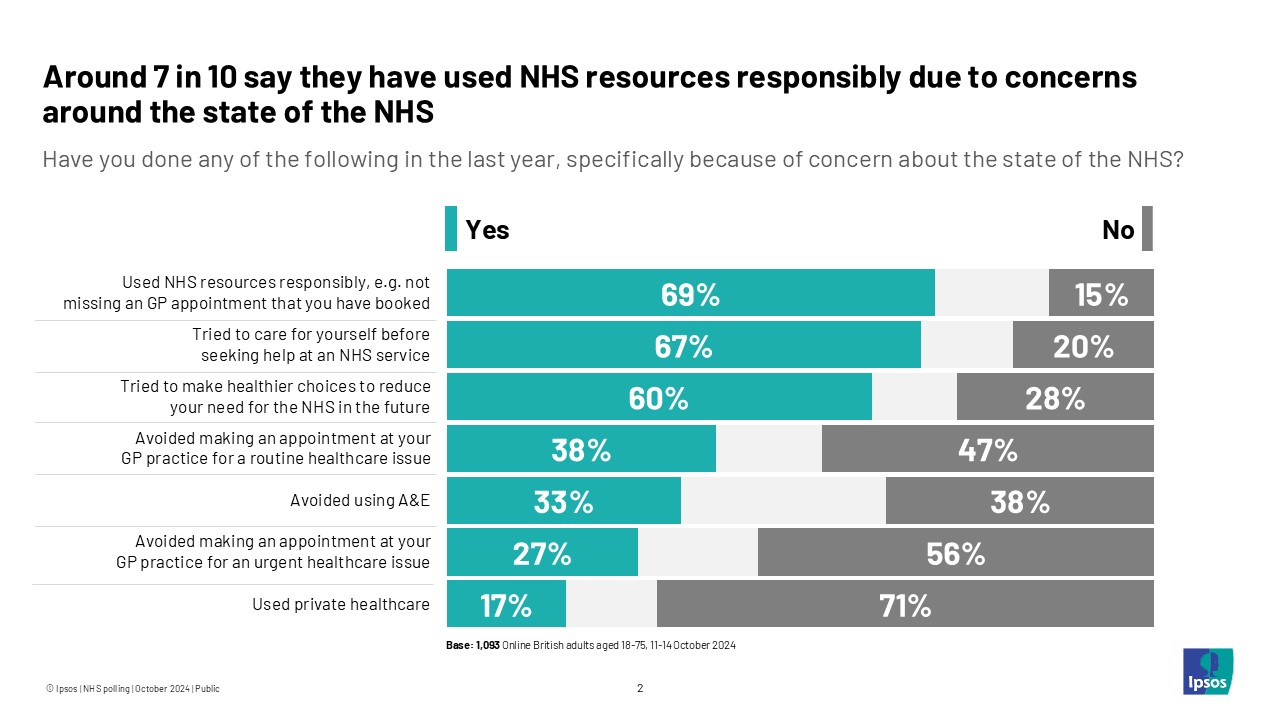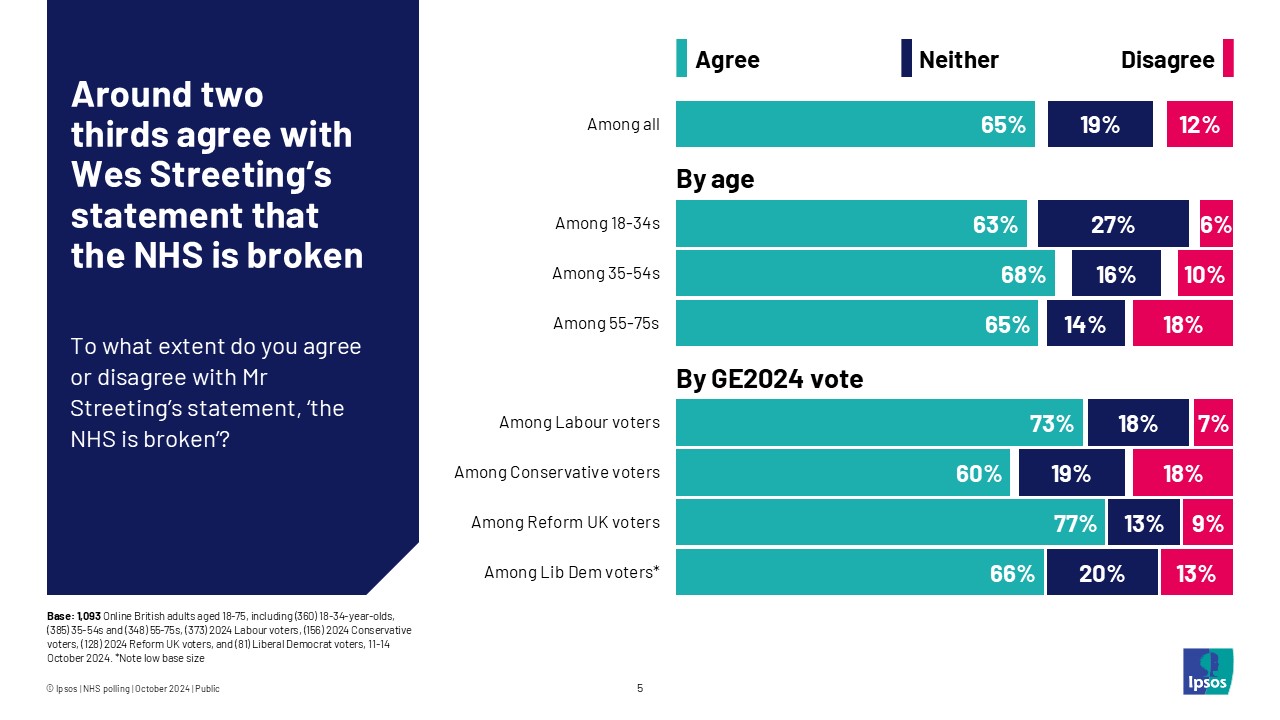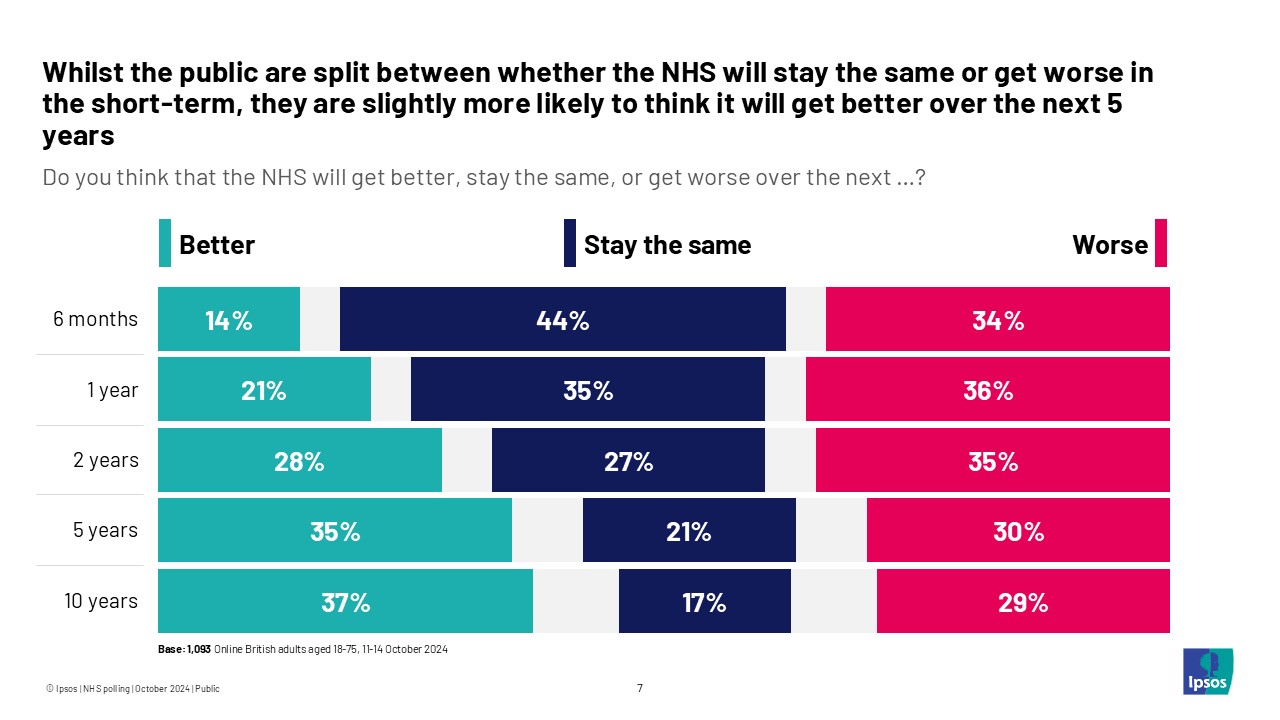"Broken NHS": Driving Patients Away?
New Ipsos poll reveals how public concerns about the health service are changing the way people seek care.
The NHS is ‘broken’ – there has been lots of talk of this in the news recently, driven by statements from the Health Secretary, Wes Streeting. Doctors and health leaders have expressed concerns that claims of a “broken” NHS would cause patients to avoid seeking help and risk their health. We wanted to test whether this was true; how aware are the public about what politicians say, and does it affect their behaviours?
So, what did we find? First, it’s clear that concern for the NHS is driving behaviour changes, but some of these could be of benefit to the NHS. For example, 69% of Britons report using NHS resources responsibly in the last year, for example not missing GP appointments and 60% have tried to make healthier choices to reduce their need for the NHS in the future.
However, the poll also revealed a concerning trend of people avoiding NHS services, which chimes with the concerns expressed by health leaders. Driven by anxieties about the system, 38% of Britons have avoided routine GP appointments, 33% have avoided A&E visits, and 27% have avoided urgent GP appointments. This avoidance underscores the depth of public concern about accessing timely and appropriate care.

Has hearing or reading that ‘the NHS is broken’ affected how people are using or will use services? Well, the poll found that 43% of the public had seen, heard or read about Streeting’s statement prior to this survey – those aged 55-74 years old were more likely to have heard it than not, with 55% of this age group aware. And those members of the public who were aware of this statement were more likely to have done the following in the last year compared with those who had not seen, heard or read the statement:
- 72% said they had used resources responsibly compared with 66% of those who had not seen, heard or read this statement
- 64% said they had tried to make healthier choices compared with 58% of those who had not seen, heard or read this statement
- 41% said they had avoided routine GP appointments compared with 36% of those who had not seen, heard or read this statement
Similar trends for each of these actions were seen in relation to future behaviours too.
However, people who had not heard the statement were more likely to avoid urgent GP appointments and equally likely to avoid A&E as those who had seen, heard or read the statement. This suggests that concern for the NHS generally is affecting public behaviours, even without opinions from the Health Secretary cutting through. Indeed, the poll found that 65% of Britons agreed with Streeting that ‘the NHS is broken’, with the sentiment resonating across the political spectrum and generations.

Those who agree with this statement are more likely to engage in the harmful avoidance behaviours in the future, including avoiding using A&E, avoiding routine GP appointments and even avoiding GP appointments for urgent healthcare issues.
While Streeting's statement resonated with many, its impact on public confidence is mixed. Just 29% said it gave them confidence that the Labour government understands the challenges facing the NHS and is taking them seriously. However, almost half (49%) said it made them more worried about the problems facing the health service and Labour's ability to fix them.
Diving into who is most worried, age and political views seem to be biggest drivers of pessimism, with people aged 35 and older and non-Labour voters more likely to be worried about whether Labour could fix the problems. Whether people agreed or disagreed with Streeting’s statement made little difference in terms of pessimism. However, 33% of those who agreed with the statement did have confidence versus 16% who disagreed, which suggests they might be reassured by the fact Streeting is recognising and vocalising the problems.
Looking ahead, public opinion is pessimistic in the short term. Just 14% believe the NHS will improve in the next six months, rising slightly to 21% in the next year. A glimmer of optimism emerges in the longer term, with 35% believing the NHS will improve over the next five years, and 37% over the next ten. Younger people aged 18 to 34 and people who voted Labour or Lib Dem in the general election are most optimistic both in the short and longer-term.

We know from Ipsos polling for the Health Foundation that the majority of the public (72%) continue to think ‘the NHS is crucial to British society, and we must do everything to maintain it’. The findings from this new poll reflect a picture of a public deeply concerned about the state of the NHS. There is also some evidence that the ‘NHS is broken’ opinion from Streeting may have influenced people’s behaviours, but many who hadn’t heard it still agreed and these groups were also avoiding or planning to avoid NHS services out of concern.
The future of the NHS remains a key concern for the public and the short-term pessimism, tempered by some hope for longer-term improvements, shows that the government have a way to go in convincing the public they are building a health service fit for the future with the 10 Year Health Plan.
Technical note:
Ipsos interviewed a representative sample of 1,093 British adults aged 18-75. Interviews were conducted online between 11 and 14 October 2024. Data are weighted to match the profile of the population. All polls are subject to a wide range of potential sources of error.



